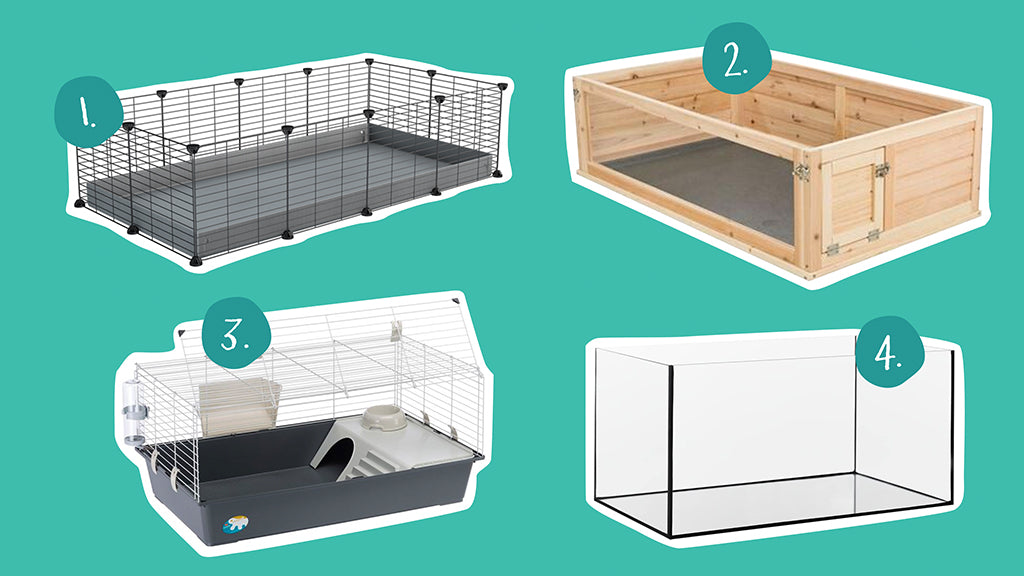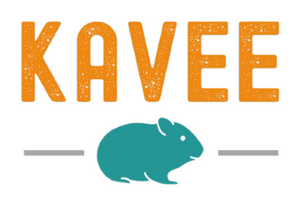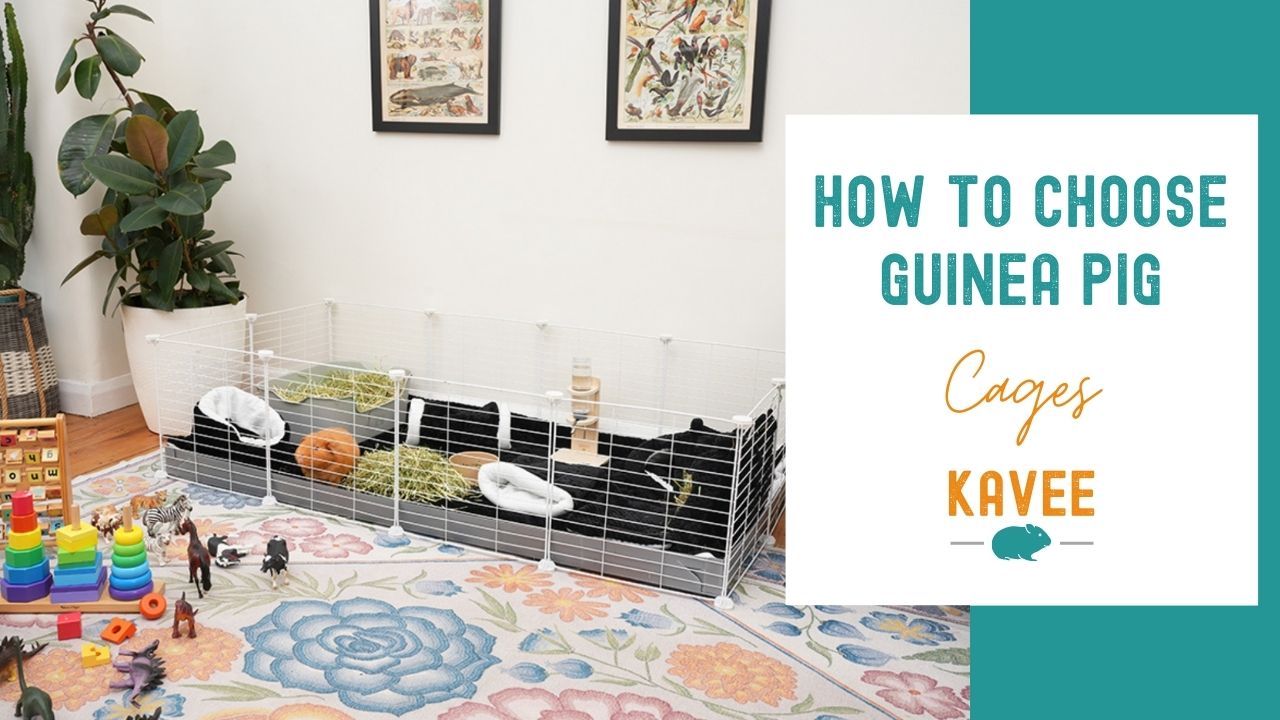Guinea pigs are adorable small pets, but their short legs like to run. As cavy care has hugely improved over the last decade or so, piggy parents have also got a much better understanding of their furry friends’ needs - and the right cage is at the top of that list. Today, piggy parents choose indoor guinea pig cages that allow their beloved pets to unfold their funny personalities and have a healthy guinea pig body and mind.
Our furry friends have a variety of needs, including space, shelter, food and water, and the right temperature and humidity - the right guinea pigs cage setup should cover all of these. So let us take you on a journey to learn about your guinea pigs’ needs in large guinea pig cages, so you can set up the perfect piggy palace for them!
Basic Cage Requirements for Guinea Pigs
When it comes to cages, there are a handful of basic cage requirements that piggy parents need to know about for their pets’ wellbeing. We’ve put together an unbeleafably handy guide for your and your floofs, covering everything from the right guinea pig cage size, the most comfortable temperature for the furry friends, and the ideal levels of humidity!
Indoor Guinea Pig Cage Sizes
Size absolutely matters when it comes to the right cages for your guinea pigs! Did you know that a small cage affects your pigs mental and physical wellbeing? Extra space makes it easier for your pigs to exercise & stay a healthy weight. After all, the walking stomachs (as we lovingly call them) eat constantly, so they need to run off that extra treat. But that’s not all - a large guinea pig cage is also important for their mental health! In fact, the right guinea pigs cage setup should give your pigs plenty to explore to keep them entertained.
The right guinea pig cage size depends on the number of pigs you have, and also their sex. Why, you ask? Male guinea pigs are more prone to bickering than their female counterparts, so they may need to spend some time apart from each other at different ends of the cage.
Guinea Pig Cage Sizes by Number of Piggies
Guinea pig cages for 2 piggies
The 4x2 C&C cage is a brilliant choice for 2 females with a total of 10 sq. ft. of floor space. While the 5x2 C&C cages make a fantastic option for 2 males with 12 sq. ft. of floor space.
Guinea pig cages for 3 piggies
The 5x2 C&C guinea pig cages are great for 3 females. While 3 male piggies would better suit a 6x2 cage with 14 sq. ft. of floor space.
Guinea pig cages for 4 piggies
If you’ve got a herd of 4 sows, they’ll live happily in a 6x2 C&C cage. While a herd of 4 boars will do best in a L-shaped 8x2 C&C cage. It’s two 4x2 cages attached to each other, so you’re giving your pigs 20 sq. ft. for plenty of room to popcorn!
A note on 3x2 C&C cages for one piggy: With a floor space of 8 sq. ft., these cages are too small for an adorable duo of pigs, so we don’t recommend this size as anything but a temporary solution.
Location of Guinea Pig Cages
Although guinea pigs originally came from South America, they’re not great with heat, cold, or humidity. So before you put together their indoor guinea pig cage, make sure to find the perfect spot for your furry friends!
The ideal temperature for guinea pigs is between 65 and 73 degrees Fahrenheit (18 to 23 degrees Celsius). So you can place their cage in a living room or a spare bedroom, never too close to a heat source or under direct sunlight as it could heat up their habitats. Guinea pigs can’t sweat, so if it gets hot in there, they're at risk of heatstroke!
Did you know guinea pigs have a sensitive respiratory system? This means that they don’t do well with strong scents, found in cleaning sprays, room fresheners, or other household staples that create fumes, like teflon (watch out when you’re cooking or using a hairdryer!).
Humidity is also something your piggies want you to think about. They do best in a low humidity, between 40 and 70 percent. So no piggy palace in the bathroom! A thermometer and a hygrometer are a great way to keep track of the temperature and humidity around their home.
The final point to help you locate the perfect piggy spot is airflow. Although the small floofs don’t like drafts, an indoor guinea pig cage needs ventilation. As piggies go for bathroom breaks all day, every day, and without proper ventilation, they can actually get sick from the smell. C&C cages are a great option to allow for proper ventilation as the air can flow through all sides with grid panels. For this exact reason, plastic cages and glass tanks aren’t a good choice as guinea pig cages.
Now, there’s something else to think about: noise levels. Guinea pigs are quite sensitive to loud noises and prone to hiding when they get spooked. So a quiet area of your home is the best choice for your guinea pigs cage setup, especially if you’re bonding with them.
The Best Guinea Pig Cage Build
When you pick the best cages for guinea pigs, the cage’s structure can make or break the deal. The floor, material, and access to all areas are key for your piggies’ comfort and safety, so here are some aspects to think about when you choose an indoor guinea pig cage.
A solid and comfortable floor
The wrong cage floor - in particular wire meshing - would be painful on your piggies’ sensitive feet and can cause a host of health issues. If you’ve heard of bumblefoot, you’ll know it’s a serious and painful condition that comes from unsuitable and unsanitary cage floors.
A coroplast base, instead, is solid, sturdy, lightweight, and easy to clean. Combine that with a comfy fleece liner for guinea pigs and you'll always keep your piggies cosy in their cage!
The right cage sides and top
When it comes to choosing the right material for the sides and top, the most important thing to consider is ventilation. To keep your pigs breathing freely, mesh grids are a great option. Just make sure to keep an eye on the bar spacing as if the spacing is too big, your piggy could get stuck in it - especially baby pigs and smaller floofs. Anything less than a 9x9 grid could cause problems to guinea pigs!
Kavee’s panels have extra narrow spacing, so they’re suitable for young piggies aged 8 weeks or older. As with any new piggy equipment, watch your pets when they first use it to make sure they’re okay. Better safe than sorry!

The right ramp for a multi-story mansion
When we talk about the room our piggies need to zoom, it’s about floor space on a single level. Adding a ramp doesn’t add to the floor space, but it’s a fantastic opportunity for more piggy exploration and foraging!
The ramp should be at a comfortable angle, since guinea pigs can’t really climb. If the ramp is too steep, they may just not use it. When you first introduce your pigs to the higher ground, try adding their favorite treats to the ramp for a little confidence boost.

Guinea pis also have really poor depth perception, so they can’t tell if they’re high up or near the ground. You can help prevent piggies from jumping off the ramp by putting slightly raised edges on them. Finally, guinea pigs have soft feet that are perfect for sliding but not for walking up and down a ramp. A Kavee ramp is already designed to protect piggies from a fall, and comes with a soft loft fleece liner to keep their feet comfy at all times.
What Do Guinea Pigs Need in Their Cage?
Now that we’re feeling ready to choose the best cages for guinea pigs, we can move onto the really exciting part: the interior design for your piggy palace. All of these accessories play a crucial part in your pets’ day-to-day life, and they also come in different colors and materials, so you can make the cage feel like a home. Let’s take a look at the must-haves for the perfect guinea pigs cage setup!
Bedding
The right bedding is essential for indoor guinea pig cages. Bedding absorbs moisture, so your sweet floofs aren’t in danger of soggy bottoms. There are lots of bedding options out there for pigs. The most popular ones are:
- Fleece liners
- Wood shavings
- Shredded paper
- Paper pellets
You can check out this blog to go more into detail of each option. At Kavee, we recommend fleece liners, as their multi-layer design absorbs moisture quickly, is soft on their paws, and is easy to clean.
Food and water
Guinea pigs need to eat regularly to keep their guts moving, so a feast should be available at all times, specifically of hay. High-quality hay is full of important nutrients, helps wear your piggies’ teeth down, and it’s the bulk of their daily food.
So 24/7 access to hay and clean water is a basic guinea pig need, and a must in any piggy palace. Read more about the right diet for guinea pigs here.
Accessories
Guinea pig cage accessories may seem like a luxury to new piggy parents, but piggies are skittish little pets. If they get scared, they need a safe place to hide - and that’s what accessories are for. Our favorite accessories include:
By having a range of these accessories at home, you'll provide your piggies with plenty of places to hide for a snooze, and also make cage cleaning day a breeze. These products can easily be cleaned in the washing machine or with a quick wipe, so that your piggies can enjoy them as often as they'd like!
So after discussing all of the above points, use the following checklist to find out whether the cage you're considering for your floofs is the best one for them. And if you have any more doubts about indoor guinea pig cages, check out our FAQs here.

Types of Guinea Pig Cages
1. C&C guinea pig cages
C&C cages are made from grid cubes and a coroplast base. These guinea pig cages have been around for 40 years, but have become a favorite with pet parents and small animal experts more recently. Here's why:
- They're easy to assemble, adapt, and store
- They're easy to customize
- They're easy to clean
- They're great for ventilation
But beware! There are lots of C&C cage companies out there, and the quality of the grids, coroplast, and accessories varies. Read up on the right coroplast, the right mesh sizing, and the right cage quality before you choose your C&C cage. Kavee offers C&C cages for every taste and size of piggy family, and our small animal experts have tested every part of our cages to ensure they benefit your piggies!
2. Wooden guinea pig cages
Wooden guinea pig cages are a popular option for guinea pigs as they're sturdy, can be handmade if you have the DIY skills, and can easily be decorated. But while some wooden guinea pig cages can make a good piggy home, there are some common complaints about them:
- They can be heavy, so difficult to move
- They aren't customisable
- They aren't as great for ventilation as other cages
- They're difficult to clean and can let cleaning products sink into the wood
- They can be unsafe if made from the wrong type of wood
3. Traditional pet store guinea pig cages
We’ll be honest - it’s rare to find guinea pig cages in pet stores that are safe and suitable for our furry friends. From the wrong size to outright dangerous parts, there isn’t much to get excited about when it comes to pet store cages. When shopping in pet stores, watch out for the following issues:
- Cage is too small - the floor space is usually below the minimum for guinea pigs
- Cage is difficult to clean
- Cage can't be customised
- Cage is of poor quality, often with steep ramps and dangerous elements
So while these cages tend to be cheaper than other alternatives, they're rarely suitable for guinea pigs.
4. Glass fish tanks
Aquariums or vivariums are sometimes used as cages for guinea pigs but, unfortunately, it’s a clear no for these. The long glass tanks are great for piggy watching and cleaning, but they aren’t great for anything else.
The problem with aquariums as guinea pig cages is that they’re really poor for ventilation and much too small for guinea pigs. For these reasons, we absolutely recommend against using fish tanks for guinea pigs!

Check out this blog on the different types of C&C indoor guinea pig cages to learn more about the options you have available to choose from.
Conclusion
There’s no one size fits all when it comes to cages for guinea pigs. While your floofy friends have basic requirements of their guinea pig cage setup, especially when it comes to the guinea pig cage size, there are lots of options for a real piggy palace that makes you and your furry friends happy.
We’re convinced that more space equals a better life for our furry friends, so if you can, it’s always good to upgrade their cage to the next bigger option. When you’re making a decision on indoor guinea pig cages, it’s good to think about size, location, the cage build, and even what accessories to get.
Whichever cage you choose for your precious pets, we know they're going to repay you with love!








